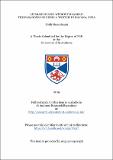Files in this item
'Literary spaces without readers' : the paradoxes of being a 'writer' in Havana, Cuba
Item metadata
| dc.contributor.advisor | Reed, Adam | |
| dc.contributor.advisor | Wardle, Huon | |
| dc.contributor.author | Rosenbaum, Molly | |
| dc.coverage.spatial | [11], 229 p. | en_US |
| dc.date.accessioned | 2019-06-19T11:14:22Z | |
| dc.date.available | 2019-06-19T11:14:22Z | |
| dc.date.issued | 2019-06-24 | |
| dc.identifier.uri | https://hdl.handle.net/10023/17927 | |
| dc.description.abstract | Cuban writers have long struggled for publishing space. Historically that had been because of repressive control of publishing mechanisms during the colonial period and the time of the Republic, which, when access was granted, required expensive systems of patronage in order for writers to see their work in print. While the Revolution advanced literacy rates and took ownership of the publishing houses, printers, distributors and booksellers, creating cheap books for the pueblo cubano, trade sanctions and the fall of the U.S.S.R. in 1991 resulted in limited resources for what had been a well-subsidised publishing system. The writers I worked with in Havana, though, are a generation newly connected to a global literary network through internet access, introducing them to market trends and concepts of mass readership. While they regularly partook in the praxis of writing, through weekly talleres [workshops], monthly peñas literarias [literary salons] and by publishing digital literary magazines, their idea of being a writer was being redefined by awareness of publishing systems internationally and new concepts of economic and cultural value, problematising their self-conception as ‘writer’. This thesis explores the context of being a writer in Cuba through my interlocutors’ conceptions of economic change, of future, of past, of literary history and of the city of Havana as a space of creation. In studying how my interlocutors interact with their texts, I question notions of literary invention and world-making and a sense of relatedness to characters. The writers I worked with were concerned with reception, with conceptions of audience, cultural value and literary tastes. This thesis attempts to show what it means to be ‘a writer’ for a group of people who see being a writer as something they simultaneously are and can never be in Cuba. | en_US |
| dc.language.iso | en | en_US |
| dc.publisher | University of St Andrews | |
| dc.subject.lcc | PQ7379.R7 | |
| dc.subject.lcsh | Cuban literature--21st century--History and criticism | en |
| dc.subject.lcsh | Literature and society--Cuba | en |
| dc.subject.lcsh | Authors, Cuban--21st century--Interviews | en |
| dc.subject.lcsh | Cuba--Intellectual life--21st century | en |
| dc.title | 'Literary spaces without readers' : the paradoxes of being a 'writer' in Havana, Cuba | en_US |
| dc.type | Thesis | en_US |
| dc.contributor.sponsor | Santander UK. Santander Universities | en_US |
| dc.contributor.sponsor | University of St Andrews. St Leonard's College | en_US |
| dc.type.qualificationlevel | Doctoral | en_US |
| dc.type.qualificationname | PhD Doctor of Philosophy | en_US |
| dc.publisher.institution | The University of St Andrews | en_US |
| dc.identifier.doi | https://doi.org/10.17630/10023-17927 |
This item appears in the following Collection(s)
Items in the St Andrews Research Repository are protected by copyright, with all rights reserved, unless otherwise indicated.

